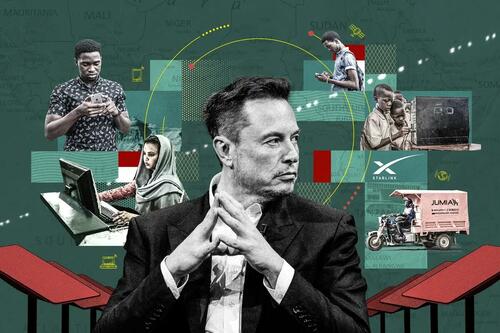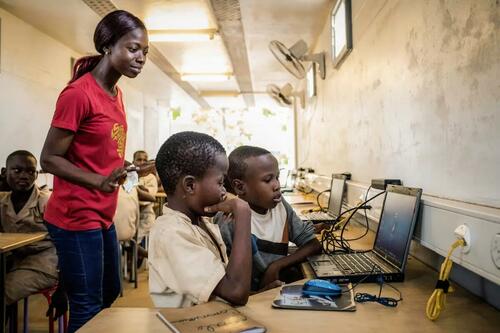Authored by Darren Taylor via The Epoch Times (emphasis ours),
Elon Musk’s revolutionary satellite internet service, Starlink, is spreading across Africa, flying in the face of repressive and corrupt regimes that are trying to block it.

In some cases, African companies are "illegally" importing and selling the equipment to allow users to bypass expensive and often state-controlled internet service providers (ISPs), and to use the cheaper and faster connectivity provided by the world’s richest man.
Many Africans living in countries where authorities haven't yet granted regulatory licenses to Starlink, which is a division of SpaceX, are also accessing its services using signal-boosting equipment.
The signal boosters enable users to link to a SpaceX "ground station" in Nigeria, which in January became the first African country to grant regulatory approval to Starlink services.
"The tech revolution is happening at a pace that most African governments just cannot keep up with," said Arthur Goldstuck, founder and CEO of World Wide Worx, one of Africa’s leading tech firms.
"The genie is out the bottle. The sooner they realize that they can’t control the uncontrollable, the better for them and the better for their people," he said.
Mr. Goldstuck said Africa is the world’s fastest-growing, but most "technologically-starved," continent.
"Data is expensive in Africa, and you can’t progress in the modern world when data is expensive. So demand for well-priced and speedy connectivity has exploded. Musk is feeding this demand," he told The Epoch Times.
"Some governments don’t like this, because they want to control everything, and mostly they want to control money and information flows."
Starlink, operated by Mr. Musk’s SpaceX spacecraft manufacturer and satellite operator, has a constellation of thousands of satellites in low orbit, delivering the world’s "most advanced broadband internet system" to 60 countries, according to its website.
Mr. Goldstuck said "progressive" African governments that encourage private enterprise and respect its ability to help develop their countries have "no problem" with Starlink and recognize its value.
"It offers high-speed streaming, video calls, and remote working, all of which contribute a lot to economic efficiency," he said.
Officially, Starlink is available in only seven of Africa’s 54 countries: Benin, Kenya, Malawi, Mozambique, Nigeria, Rwanda, and Zambia. Another 25 are scheduled to go online in 2024.

"Look at where [the] powers-that-be are trying to prevent the entrance of Starlink: It’s war-torn countries like Sudan, Libya, and Somalia. It’s repressive regimes like Congo and Equatorial Guinea, that restrict access to information," Mr. Goldstuck said.
"And it’s governments that have vested interests in keeping data expensive, and that have unreasonable rules designed to benefit political elites, like South Africa."
Some African governments slap heavy taxes on private telecom services and infrastructure.
For decades, the data needed to access the internet in Africa has been controlled by just a few multinational mobile telecommunications corporations, including South Africa’s MTN Group and Vodacom, and Kenya’s Safaricom.
Their data packages are prohibitively expensive.
In July 2022, research by British technology company Cable, published in Mobile Magazine, showed that six of the 10 countries with the most expensive data are in sub-Saharan Africa.
In the tiny, mineral-rich kleptocracy of Equatorial Guinea in Central Africa, one gigabyte (GB) costs almost $50, the highest price for data in the world. In Chad, 1 GB costs $24.
Until Starlink’s recent arrival, 1 GB was priced at $26 in Malawi.
An August 2022 report by global statistics service Statista calculated the average cost of 1 GB of mobile data in sub-Saharan Africa at $4.47.
A one-time hardware and installation cost of Starlink kits, which contain a motorized satellite dish, assorted cables, a metal tripod stand, a power adapter, and a Wi-Fi router, is about the same everywhere: $550.
But basic monthly subscription prices in the developed world, compared with those in Africa, are very different.
In the United States, for example, Starlink’s monthly service fee is $110. In the African countries that officially have Starlink, the average price is about $45.
This $45 package allows users to download 1,000 GB of data, meaning 1GB costs Africans less than $0.50—nine times cheaper than the average in sub-Saharan Africa.
"This is a no-brainer," said Nigeria-born Makinde Adeagbo, a freelance software engineer who has worked at Facebook, Microsoft, and Pinterest, and is currently based in Silicon Valley.
"It’s no wonder African companies are coming up with all kinds of schemes to get access to Starlink," Mr. Adeagbo said.
"Because of the equipment cost, it’s too expensive at the moment for the vast majority of Africans to afford. But businesses, government departments, schools, shopping centers ... They sure can afford it."

South Africa, the nation in which Mr. Musk was born, is potentially the continent’s most lucrative telecom market. It's also one of those trying to obstruct Starlink.
South Africa's ruling African National Congress has enacted the Electronic Communications Act, which requires all telecom firms operating in South Africa to be 30 percent owned by "groups and/or individuals historically disadvantaged" by apartheid.
In May, at a tech carnival in Johannesburg, Starlink Director of Sales Phillip van Essen was diplomatic when he addressed the question of why Starlink isn’t officially present in Africa’s most technologically advanced economy.
"We prioritize the countries that make it easy for us to do business there, open entities, and get regulatory approvals," he told reporters.
"We respect that every country has their own process. ... and we have a dedicated team that is focused on regulatory efforts globally, including South Africa. We're hopeful that we can resolve the issues and start service here soon."
Since then, however, the government—via its Independent Communications Authority of South Africa— (ICASA), has clamped down on companies offering Starlink packages in the country.
In June, IT-Lec, a firm selling internet access in South Africa’s remote Northern Cape province, imported more than 4,000 Starlink start-up kits.
"Because of its portability and ease-of-use—not to mention low cost and high speed—we saw the Starlink kit as ideal for our customers," Mauritz Coetzee, IT-Lec's managing director, told The Epoch Times.
"They stay in the most isolated, rural areas of South Africa, where they’re not able to get broadband connectivity because the established ISPs don’t operate where they live."
Mr. Coetzee said he didn’t "just blindly buy" thousands of Starlink kits.
"My legal advice was that I was completely within my rights to use Starlink’s international roaming service," he said.
IT-Lec was able to provide Starlink services for South Africans by purchasing a Starlink International roaming subscription in neighboring Mozambique, where Starlink is authorized to operate, and then selling the required equipment to clients.
Read more here...